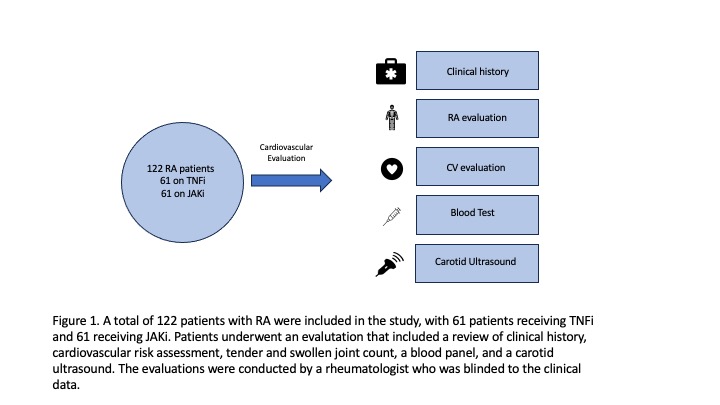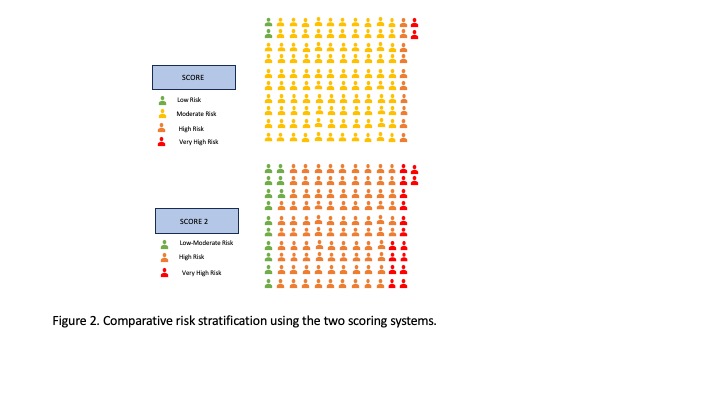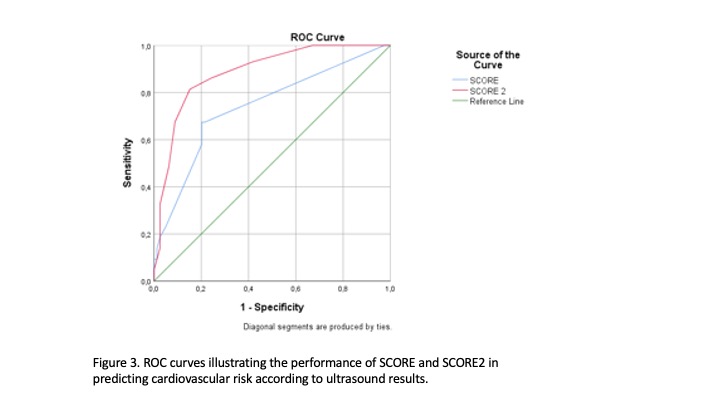Session Information
Session Type: Poster Session A
Session Time: 10:30AM-12:30PM
Background/Purpose: Rheumatoid arthritis (RA) escalates the risk of premature mortality, predominantly through cardiovascular diseases. Although SCORE and its updated version, SCORE2, are employed to assess CVD risk, they may not fully capture the cardiovascular risk profile of RA patients. This study aims to evaluate the effectiveness of SCORE2 compared to the SCORE in predicting the presence of carotid plaques or intima-media thickness as detected by ultrasound in patients with RA
Methods: A cross-sectional single center study was conducted including adult patients diagnosed with moderate to severe RA who had initiated treatment with JAK inhibitors or anti TNF inhibitors from September 2022 to April 2023. Both SCORE and SCORE2 were calculated for each participant. Participants underwent a detailed carotid ultrasound examination in which the presence of plaques were documented and carotid intima- media thickness (IMT) was measured.
Results: 122 patients were included. The mean SCORE was 2.48%, whereas SCORE2 was significant higher at 4.07% (p< 0.01). SCORE identified only 12 (9.8%) cases as high risk while SCORE2 detected 99 (81.1%). The 34% (n=42) of the participants exhibited atherosclerotic plaques. The presence of traditional cardiovascular risk factors (DL, DM, HBP and smoking) was significantly associated with the ultrasound estimated risk.
In 87 cases that SCORE underestimates, 34 cases (39% of the 87) classified as low-moderate risk by the SCORE that present high risk according to the ultrasound. These 34 patients were adequately classified by SCORE2. However, there are 54 cases of patients classified as high risk with SCORE2 with a normal carotid ultrasound. Thus, sensitivity of SCORE in plaque prediction was 21% and 100% for SCORE2. Using SCORE and Carotid Ultrasound together increases the detection of patients at high risk compared to the use of SCORE alone (going from 9.8% to 37.7%), but using SCORE2 and carotid ultrasound together does not increase the detection of high-risk cases compared to the use of SCORE2 alone, with the figure at 81.1%.
Conclusion: The findings of our study underscore the superior performance of SCORE2 over its predecessor, SCORE, in identifying patients with carotid ultrasound alterations, therefore at heightened cardiovascular risk.
To cite this abstract in AMA style:
Campos Fernández C, Fragío Gil J, González Mazario R, Martínez Calabuig P, Salvador Maicas L, Sanmartín Martínez M, Lorente Betanzos I, Molina Almela C, Lerma Garrido j, Rueda A, Román-Ivorra J. SCORE2 Is Superior to SCORE in Predicting the Presence of Carotid Plaques and Intima-media Thickness in Rheumatoid Arthritis Patients: A Cross-sectional Study with Carotid Ultrasound [abstract]. Arthritis Rheumatol. 2024; 76 (suppl 9). https://acrabstracts.org/abstract/score2-is-superior-to-score-in-predicting-the-presence-of-carotid-plaques-and-intima-media-thickness-in-rheumatoid-arthritis-patients-a-cross-sectional-study-with-carotid-ultrasound/. Accessed .« Back to ACR Convergence 2024
ACR Meeting Abstracts - https://acrabstracts.org/abstract/score2-is-superior-to-score-in-predicting-the-presence-of-carotid-plaques-and-intima-media-thickness-in-rheumatoid-arthritis-patients-a-cross-sectional-study-with-carotid-ultrasound/



